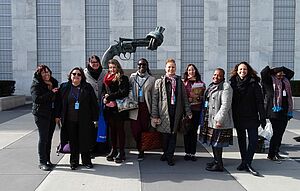More studies needed on the exclusion and marginalization of women and girls
Although there are many significant studies on gender disparity, studies on the underlying structures and intrinsic layers of subjugation, marginalization and exclusion targeting women and girls in their contexts and environments are not satisfactory.
There are to date only limited studies on how intrinsic structures of exclusion and subjugation of women and girls intersect with socio-geopolitical, economic variables and factors and their impact. There is a deficit of academically grounded understandings of the structures and strategies of power as it negotiates itself to exist and function in various discourses and contexts (be it at the centre or the periphery) to disempower and exclude women. In countries where seniority and patriarchy hold the upper hand, women, girls and youth are subject to exclusion and marginalization. This knowledge gap has led to an emerging context of paradoxical readings, outcomes and findings.
"The high levels of female presence in education across the world has not translated into equal engagement and inclusion of women and girls in the political and labour-force spaces."
For instance, the high ratio of enrolled females in Jordan in schools and universities, and their high academic achievement, does not manifest itself in more engagement of women in economic and political spheres: In fact, female participation is taking a back seat, and the very few women in top positions always face a backlash if they act in a way that does not fit within the confines of male conduct. Equally, the high levels of female presence in education across the world has not translated into equal engagement and inclusion of women and girls in the political and labour-force spaces.
Women, in the Arab world as elsewhere, have always been biologically and culturally undermined in a systematic way. More attention is now required on this matter, and academic efforts should be invested to investigate how women are exposed to hard and soft marginalization and exclusion, how they are coerced into it, co-existing with it and how they are fighting it.
Studies are also limited on how marginalization and exclusion (intrinsic and extrinsic) is socialized, politicized, and naturalized in various context. The regulatory and constitutional contexts should be closely read and examined to uncover the underlying structures of exclusion and marginalization that trigger symbolic annihilation of women and girls and shape public opinions and sentiments. Besides, the structures of power relations and dynamics of decision-making should be scrutinized to see how they shape the feminine and the masculine agencies.
Many of us know of women and girls who have been subject to either marginalization or exclusion, and seen their victimization tolerated and covered up.
As it is hard to measure the psychological impact of marginalization, exclusion and subjugation, this has been a field that has not received enough focus in women’s studies.
Marginalisation and exclusion are violent acts on the subjectivity, the personhood, self-worth and agency of women and girls. This field requires more attention and focused studies. Alarming practices occur when women’s roles are still viewed within the personal sphere of sexuality and the family. Women are still perceived as either the biological machines of reproduction or a symbol of the nation’s honour.
It is still widely promoted that a woman’s best choice is to marry and have children. Her worst fate, if she is believed to have failed to maintain the honour of the family through preserving her chastity, is to be killed.
Being a woman thus often means a perpetuation of her biologically determined roles, subservience and acceptance of violence against her.
"School textbooks narrate history, science, technology, knowledge, homeland, citizenship, democracy, pen, scales and ploughs as limited to the ownership of the male-only agency and context, while the stories of women and girls are narrated in absence, or in sub-texts and in marginal passive contexts."
The school learning environment and the overall learning experiences are the first platform where concepts, beliefs, values, mindset and imagination habits are built in and gender identity is socialized. I have recently conducted a study on how women and girls are portrayed in school textbooks. Women, for example, are almost completely erased from history books as founders, scientists and reformists; their contribution to state or nation building is completely ignored; they are erased from the Arab and Islamic memory and the archives of scientific advancement and evolution. Men and boys, in contrast, occupy all public and private places, as reflected in the current Arabic and social studies school textbooks. Women and girls, conversely, are ghettoized in the bedroom, in the house, in the garden and school, causing a sense of exclusion of women and girls. Moreover, school textbooks narrate history, science, technology, knowledge, homeland, citizenship, democracy, pen, scales and ploughs as limited to the ownership of the male-only agency and context, while the stories of women and girls are narrated in absence, or in sub-texts and in marginal passive contexts. This is a forced and coercive stereotypical representation of women not only in school textbooks in Jordan but in various countries in the world.
A generation that is suffering from internal conflicts—i.e. torn between slogans of equality on the one hand and practices and performances that are rooted in gender gaps and marginalization and exclusion of women on the other hand—might be led to violent behaviour.
The world needs to view matters from the right angle and play the game right: Paradigms and channels of equal inclusion of women and girls need to be created, through which older, familiar binary disputes can be broken down and re-imagined in ways that highlight values of women’s and girls’ engagement and inclusion that transcend conflicting boundaries.
With these priorities of research and focus, we can move the trajectory of ending marginalization and exclusion of women and girls to where we aspire to be. ###
Wafa Awni Alkhadra, an associate professor and an acting dean at the American University of Madaba, is a feminist and an academic activist.
About FES Connect
Connecting people, in the spirit of social democracy, we source and share content in English from the German and international network of the Friedrich-Ebert-Stiftung.







